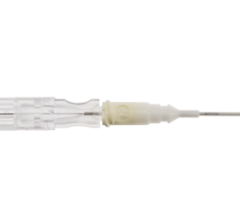
October 5, 2010 – A U.S. clinical study evaluating the CrossBoss and Stingray catheters in treating chronically occluded coronary arteries concluded in August and Bridgepoint Medical has asked the Food and Drug Administration (FDA) to expand the indication for the devices.
BridgePoint Medical Inc., focused on coronary and peripheral catheter-based systems for chronic total occlusion (CTO) recanalization, announced the completion of the FAST-CTOs study. BridgePoint's 16 center, 147 patient U.S. FAST-CTOs (Facilitated Antegrade Steering Technique for the treatment of Chronic Total Occlusions) study was designed to assess the safety and effectiveness of the CrossBoss and Stingray devices in chronically occluded coronary arteries.
The FAST-CTOs data were unveiled to the interventional community at the TCT conference in Washington, D.C., by study investigator R. Michael Wyman, M.D. Wyman highlighted a 77 percent overall effectiveness of the BridgePoint CTO recanalization system in patients that were refractory to the current standard of care. In addition, the data show that crossing success accelerated to 86 percent in the last half of the trial as investigators became more facile with the devices and associated techniques. Wyman highlighted that the FAST-CTOs study included more difficult (longer length) total occlusions while achieving a significantly higher success rate and lower adverse event rate as compared to other CTO clinical trials.
"In coronary CTO revascularization, operator technique and new guidewire technology have lead to modest improvement in short term antegrade success over the last decade, and drug-eluting stents have dramatically improved long-term durability. Despite these advances attempt rates remain low and the presence of a CTO remains the primary reason for referral of a patient to bypass surgery," said Patrick Whitlow, M.D., FAST-CTOs study principal investigator. "The high success rate in very long, difficult CTO cases found with the CrossBoss and Stingray in FAST-CTOs represents a major step forward and a new standard in CTO intervention. The safety of the devices and intuitive ease of use coupled with the remarkable success should expedite rapid adoption of these new devices into clinical practice."
BridgePoint announced Monday it also received FDA clearance to begin its investigational device exemption (IDA) PFAST-CTOs study (Peripheral Facilitated Antegrade Steering Technique for the treatment of Chronic Total Occlusions). The 50 patient 10 center trial is intended to assess the safety and effectiveness of the BridgePoint recanalization system in lower extremity CTOs.
The BridgePoint CTO recanalization system used in both studies includes an over-the-wire CrossBoss Catheter delivered over standard guidewires to the site of a chronic total occlusion. The blunt tip CrossBoss Catheter utilizes the Fast-Spin technique to facilitate crossing of CTOs along true lumen or subintimal pathways. The Stingray Catheter is an over-the-wire re-entry system allowing true lumen access from a subintimal plane. In concert, the system allows subsequent revascularization by debulking, balloon angioplasty and stent placement. For many patients, this minimally invasive, endovascular approach to CTO recanalization may eliminate the need for invasive bypass surgery and chronic reliance on pharmacologic therapy.
For more information: www.bridgepointmedical.com


 October 28, 2025
October 28, 2025 









